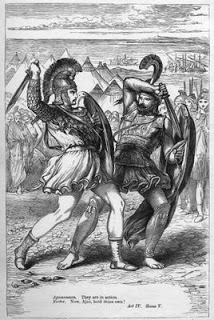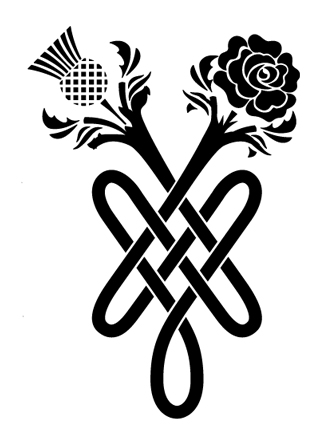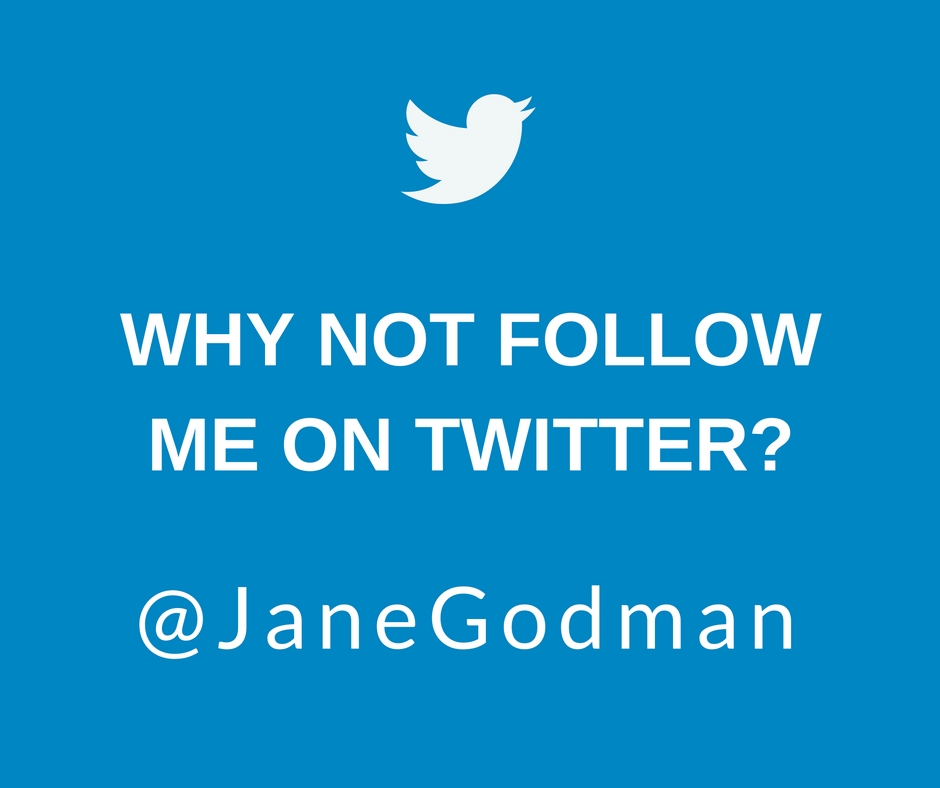
The Unknown Ajax
In this novel, the numerous references to Troilus and Cressida arise not within the romantic plot but from the hostility towards the new heir (the ‘weaver’s brat’) in the Darracott family. Vincent Darracott, whose nose has been put out of joint by the arrival of a cousin he didn't know existed, gives us most of these lines.
Hugh Darracott, the heir, is his noble family’s worst nightmare because his father married a weaver's daughter. This explains Vincent’s hostility and his assumptions about Hugo’s intelligence and breeding. He resorts to using taunting references comparing Hugh to the intellectually challenged yet heroically proportioned Ajax in Troilus and Cressida. Vincent's Shakespearean jibes are aimed to insult Hugh on two levels, firstly by suggesting that he is as dim witted as Ajax and secondly by drawing attention to his own superior education.
In GH's novels, however, matters are never quite as they seem. Hugh is not as volatile or as vain as Ajax and he is far from dimwitted, though he is content to play the Yorkshire dullard in front of his newly discovered family.
The heroine of the story is his cousin, Anthea Darracott, who sees through his adopted persona early on. She confronts him about his education and he admits he attended Harrow.
Moreover, when a major event threatens the reputation of the whole family, Hugo uses brains rather than his brawn to resolve the matter. Anthea takes Vincent’s early taunts and reverses them to tell her giant suitor, "Noble Ajax, you are as strong, as valiant, as wise, no less noble, much more gentle, and altogether more tractable!". Hugo, with typical humility and humour replies, “Nay, lass!”.
Sprig Muslin
Georgette Heyer invokes Romeo and Juliet's balcony scene in order to highlight how far from the star-crossed lovers is the situation between the wilful Amanda and her would-be rescuer:
"Perched on a stable-ladder, a modern Romeo and Juliet discussed ways and means. It did not take long for them to disgard the trappings of convention. 'Oh, I wish you will not call me Miss Smith!' said Juliet. 'Amanda!' breathed Mr Ross reverently. 'And my name is Hildebrand'".
It seems GH uses a Shakespearean allusion, to demonstrate the farce of the situation rather than create a romantic illusion.
Venetia
The lovers-to-be quote Shakespeare to each other in their first meeting, when Damerel steals a kiss from the girl he takes to be a country lass:
“How full of briars is this work a day world!” (from ‘As You Like It’).
"And Beauty's self she is". The quotation's context offends proprieties, but so does Venetia's response that he is "a most pestilent complete knave". Her quotation comes from Othello where Iago is maligning Cassio to Roderigo. The end of his sentence in the play reads, "and the woman hath found him already". Since Iago is insisting that Desdemona has been intimate with Cassio, Venetia's embarrassment is understandable, though GH does not explain it:
"Venetia, suddenly remembering the rest of the quotation, replies, 'If you don't know, I certainly shan't tell. That phrase is apt enough, but the context won't do'".
GH does, however, give her readers a clue since Damerel comments that he had better study his Shakespeare. By the end of the page he supplies his own quote from Othello:
"My reputation, Iago, my reputation!".
Since he even gives one of Cassio's lines, it seems clear that both characters know the true reasons for Venetia's earlier comment. Even though there is no guarantee that the reader will get the joke, the bantering of the characters shows clearly that they understand each other and that Shakespeare is a language they share. By the end of their first encounter, Venetia has moved to deflate Damerel’s flowery compliments by quoting Olivia's dismissive list of her beauties in Twelfth Night - “item two lips indifferent red” - completing a couplet of "Cherry-Ripe" and remembering an appropriate quotation from Byron.
Shakespeare is not the only writer that this unusual pair share, but he frequently crops up throughout the novel. When Venetia finally proposes to her rakish love at the end of the novel, she takes the cue of wooing from Viola's willow cabin speech in Twelfth Night:
"I warn you, love, that if you cast me out I shall build a willow cabin at your gates--and very likely die of an inflammation of the lungs, for November is not the month for building willow cabins!".
Venetia and Damerel both have a delightful knack of quoting Shakespeare’s more romantic lines and then bringing them down to earth by pointing out the commonplace or inconvenient within them.
In this novel, the numerous references to Troilus and Cressida arise not within the romantic plot but from the hostility towards the new heir (the ‘weaver’s brat’) in the Darracott family. Vincent Darracott, whose nose has been put out of joint by the arrival of a cousin he didn't know existed, gives us most of these lines.
Hugh Darracott, the heir, is his noble family’s worst nightmare because his father married a weaver's daughter. This explains Vincent’s hostility and his assumptions about Hugo’s intelligence and breeding. He resorts to using taunting references comparing Hugh to the intellectually challenged yet heroically proportioned Ajax in Troilus and Cressida. Vincent's Shakespearean jibes are aimed to insult Hugh on two levels, firstly by suggesting that he is as dim witted as Ajax and secondly by drawing attention to his own superior education.
In GH's novels, however, matters are never quite as they seem. Hugh is not as volatile or as vain as Ajax and he is far from dimwitted, though he is content to play the Yorkshire dullard in front of his newly discovered family.
The heroine of the story is his cousin, Anthea Darracott, who sees through his adopted persona early on. She confronts him about his education and he admits he attended Harrow.
Moreover, when a major event threatens the reputation of the whole family, Hugo uses brains rather than his brawn to resolve the matter. Anthea takes Vincent’s early taunts and reverses them to tell her giant suitor, "Noble Ajax, you are as strong, as valiant, as wise, no less noble, much more gentle, and altogether more tractable!". Hugo, with typical humility and humour replies, “Nay, lass!”.
Sprig Muslin
Georgette Heyer invokes Romeo and Juliet's balcony scene in order to highlight how far from the star-crossed lovers is the situation between the wilful Amanda and her would-be rescuer:
"Perched on a stable-ladder, a modern Romeo and Juliet discussed ways and means. It did not take long for them to disgard the trappings of convention. 'Oh, I wish you will not call me Miss Smith!' said Juliet. 'Amanda!' breathed Mr Ross reverently. 'And my name is Hildebrand'".
It seems GH uses a Shakespearean allusion, to demonstrate the farce of the situation rather than create a romantic illusion.
Venetia
The lovers-to-be quote Shakespeare to each other in their first meeting, when Damerel steals a kiss from the girl he takes to be a country lass:
“How full of briars is this work a day world!” (from ‘As You Like It’).
"And Beauty's self she is". The quotation's context offends proprieties, but so does Venetia's response that he is "a most pestilent complete knave". Her quotation comes from Othello where Iago is maligning Cassio to Roderigo. The end of his sentence in the play reads, "and the woman hath found him already". Since Iago is insisting that Desdemona has been intimate with Cassio, Venetia's embarrassment is understandable, though GH does not explain it:
"Venetia, suddenly remembering the rest of the quotation, replies, 'If you don't know, I certainly shan't tell. That phrase is apt enough, but the context won't do'".
GH does, however, give her readers a clue since Damerel comments that he had better study his Shakespeare. By the end of the page he supplies his own quote from Othello:
"My reputation, Iago, my reputation!".
Since he even gives one of Cassio's lines, it seems clear that both characters know the true reasons for Venetia's earlier comment. Even though there is no guarantee that the reader will get the joke, the bantering of the characters shows clearly that they understand each other and that Shakespeare is a language they share. By the end of their first encounter, Venetia has moved to deflate Damerel’s flowery compliments by quoting Olivia's dismissive list of her beauties in Twelfth Night - “item two lips indifferent red” - completing a couplet of "Cherry-Ripe" and remembering an appropriate quotation from Byron.
Shakespeare is not the only writer that this unusual pair share, but he frequently crops up throughout the novel. When Venetia finally proposes to her rakish love at the end of the novel, she takes the cue of wooing from Viola's willow cabin speech in Twelfth Night:
"I warn you, love, that if you cast me out I shall build a willow cabin at your gates--and very likely die of an inflammation of the lungs, for November is not the month for building willow cabins!".
Venetia and Damerel both have a delightful knack of quoting Shakespeare’s more romantic lines and then bringing them down to earth by pointing out the commonplace or inconvenient within them.







 RSS Feed
RSS Feed